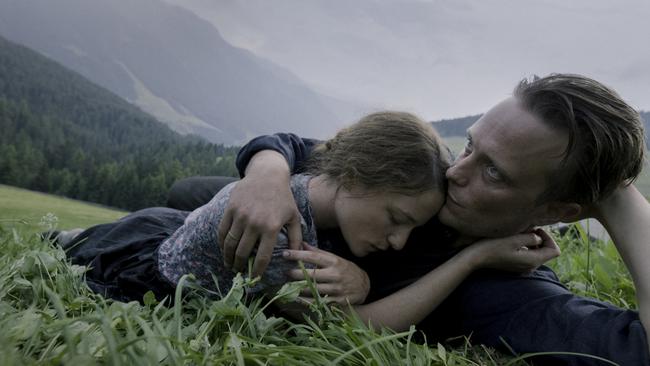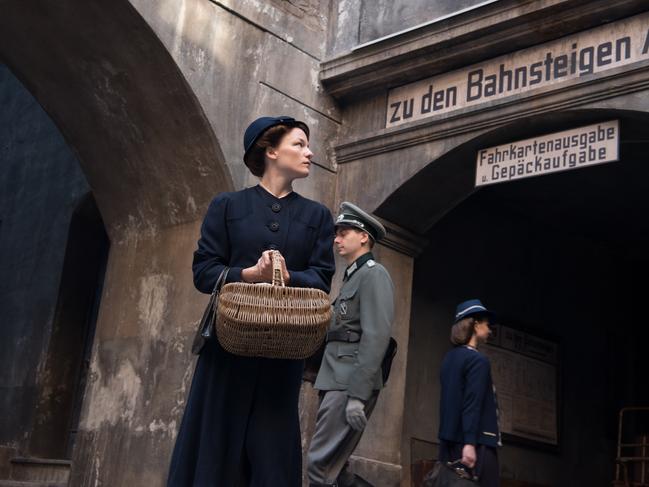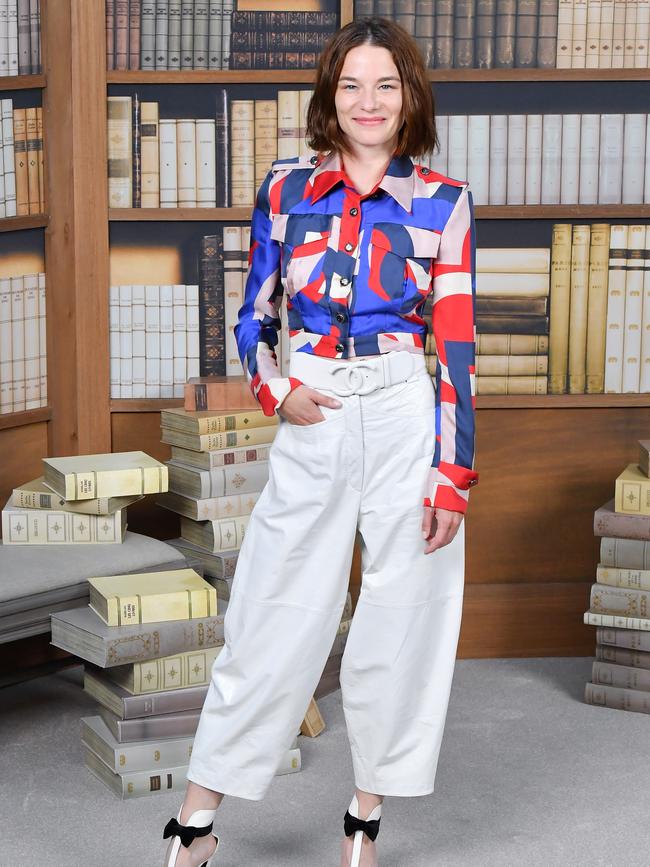Valerie Pachner is the farmer’s wife in A Hidden Life
As a farmer’s wife in A Hidden Life, Valerie Pachner found herself driven by the rhythms of nature.

There were times, Valerie Pachner says, when she felt more like a farmer than an actor. For her role in Terrence Malick’s new movie, A Hidden Life, she spent weeks of preparation and months of the shoot carrying out the daily routine of a woman working on the land.
She learned how to use a scythe, how to churn butter, milk a cow and shear a sheep, and during production, she says, those activities were a focus for her and her co-star, August Diehl. “We’d say ‘Have you milked the cow today?’ more than we’d talk about a scene.” It wasn’t a matter of doing things realistically for the camera, she says, it was a way of understanding who their characters were and what mattered to them.
A Hidden Life takes its name from the words of George Eliot in Middlemarch, quoted at the beginning of the film: “The growing good of the world is partly dependent on unhistoric acts; and that things are not so ill with you and me as they might have been, is half owing to the number who lived faithfully a hidden life, and rest in unvisited tombs.”
It’s based on a true story from World War II. Its central characters are Franz Jagerstatter (Diehl) and his wife, Fani (Pachner), who farmed high up in the Austrian mountains in the village of St Radegund in the 1930s.

When war comes, Franz is called up for training at first, then he’s expected to serve. He refuses to join the army. He does not want to take another life. Neither is he willing to serve in a medical or non-combatant role, because he is not prepared to swear an oath of allegiance to Hitler.
He is tried, imprisoned, sentenced. Back home, Fani does her best to look after the farm and the family: their three young daughters, her sister and Franz’s mother. She does her best to find him lawyers and to plead his case. They keep in touch by letter; occasionally, they are able to see each other.
A Hidden Life is about Franz’s single-minded refusal and its consequences, but it is also about Fani’s equally determined willingness to support him. There are two lives to reflect on in this story. Pachner talks about the way “their togetherness and love gives them so much strength. It made it possible for both of them. Alone, it would not have been the same, or not even possible.”

At first, their lives are depicted with a kind of quiet certainty that has its own lyrical beauty: there’s a joy and a sense of freedom in the world that these characters inhabit, circumscribed and gruelling as it might be. With the daily routine of life on the farm, Pachner says, “we did all those things for real, and that really helped because it felt it was so essential to them”. Franz was a devout Catholic, but there was more to his beliefs than this. Being close to “the ground, the earth, nature” informed who Franz and Fani were, she says. “I felt that their faith and their love came from them and from being connected with the nature around them.”
In Austria, the story of Franz and Fani is familiar to many, although Pachner didn’t realise this was what the film was about when she first auditioned for it. She knew it was a World War II story but that was about all. She was given nothing to prepare. The first audition drew on correspondence between the couple when they were separated. “They gave me one of the original letters in English and I improvised with it,” she says, still not realising who the characters were. Pachner was cast first, ahead of Diehl.
Improvisation continued on set, Pachner says. “It’s based on true events so you couldn’t go that far, but it was almost like, at the core was the script and the story, but then Terry really allows you to be free with it and not too strict about the script. He’d say, do it in English and then in German, then do it without words, so there was a lot of freedom to explore character and story and come up with our own ideas and try them out.
“What you see in the film is a lot of the script but also many little scenes that were not scripted during the process of shooting.”
Working with Diehl, “the chemistry was there, immediately, we didn’t have to work on it, it was quite natural. And also it was like jumping into cold water, there wasn’t really time, we didn’t rehearse”.
By taking a stand, Franz sets himself apart from the rest of the village. Those around him don’t see it his way, to say the least. First, it’s as if he’s asserting moral superiority; later, they say that he is cowardly, refusing to risk his life while others from the village are killed in action. Most also shun, abuse or threaten Fani. She is as isolated in her way as he is.
During the shoot, Pachner and Diehl never really discussed the choices their characters made. “We had a sense that what he decides and she supports — which is ultimately the same — is really not so hard to understand. They have this very strong feeling of what is right, and that is there. They don’t even really need to discuss it.”
There are debates and discussions in the film about Franz’s decision, but they tend to happen around him, rather than with him.
Thinking about the film now, Pachner says: “I like that it’s not about a revolutionary, someone who tries to persuade others. Not everyone has charisma, or is a leader, but what everyone can do is decide what is right and what is wrong and follow that.”
The three young daughters of Franz and Fani are still alive. They are now in their 80s and living in the area where they grew up. “We met them during the shoot, and we had two days in the real house where they lived,” Pachner says. Malick screened the film for them at their house, shortly before it premiered in competition at Cannes. She acted as a simultaneous interpreter, translating the English parts of the film into German for them.
Working with Malick, what struck her most, she says, “was his way of putting freedom first. That sounds weird, but very often when you come to set it’s stressful, you have to do all these scenes in a day, but there it felt like, ‘oh, we have all day, and so much time’.
“And the way he shoots just gives you that time. We only used natural light, which made it easier too” because there were no time-consuming lighting setups. The extreme wide-angle lens also helped. “It allows you to move around, and you don’t have to think about landing on a mark.
“You come to set and you know what is planned but we would end up doing other things, you could come up with your own ideas, which is also unusual — I realised that I could really contribute, as an actress I didn’t just have to deliver lines, I could really contribute to the whole project. And that was quite special, that’s very unusual.”
A Hidden Life opens on January 30.



To join the conversation, please log in. Don't have an account? Register
Join the conversation, you are commenting as Logout